Trans-Pacific View author Mercy Kuo regularly engages subject-matter experts, policy practitioners, and strategic thinkers across the globe for their diverse insights into U.S. Asia policy. This conversation with Dr. Ming Huang – professor of finance at the Samuel Curtis Johnson Graduate School of Management, Cornell University – is the 88th in “The Trans-Pacific View Insight Series.”
What key factors are driving China’s capital controls?
The primary purpose of China’s capital controls is to limit the drawdown of China’s foreign currency reserve while keeping the RMB/USD exchange rate relatively stable. For about two years now, the Chinese RMB has been under market pressure to depreciate against the U.S. dollar. As China’s central bank worked to slow down the decline (by buying RMB), its foreign currency reserve shrank from $4 trillion to $3 trillion. With the United States entering its rate hike cycle and China reluctant to tighten its monetary policy due to fear of economic slowdown, there is increased downward market pressure on the RMB.
China’s central bank, however, is neither willing to let the RMB suffer a drastic decline due to considerations of financial stability and international trade frictions, nor willing to let its foreign currency reserve drop down to dangerous low levels. So the only remaining option is to impose strict capital controls.
With the upcoming 19th National Party Congress in the fall, to what degree are politics or policy contributing to tighter capital controls?
Both politics and policy contribute to tighter capital controls. A steep decline in either RMB value or foreign currency reserve can potentially lead not only to financial instability and international trade frictions, but also social and political instability in a society that has never experienced such volatility and has somehow adopted a false view (under influence by pundits) that the strength of China’s currency and its foreign reserve is a symbol of national strength and prestige. I expect that China’s central bank will work hard to keep both the RMB and its foreign reserve relatively stable before the 19th National Party Congress in the fall, so capital controls will remain in place at least until then, and possibly for much longer.
Assess the validity of the Trump administration’s criticism that the U.S. trade deficit with China is related to its monetary policy.
The Trump administration’s criticism that China enjoys unfair advantage on trade with the United States by keeping its currency below market value is simply false. If anything, China’s central bank is trying very hard to not let the RMB fall too fast in recent years. If left to market forces alone, China’s RMB would have gone down a lot more. Even China’s trade surplus cannot sustain the RMB at its current level. The main driver, in my view, is that many years of loose monetary policy and the resulting asset bubbles in China, coupled with the desire of many Chinese to diversify their asset holdings internationally for various reasons, have created an unprecedented unmet demand to purchase foreign currency.
What would a currency war between China and the United States look like and would it precipitate a bilateral trade war?
I don’t think there will be a “currency war” between the U.S. and China. A more relevant question is what happens if China, at some point, allows the RMB to drop sharply against the U.S. dollar. Even if such drop is driven by market forces, the U.S. government will probably exert pressure on China by threatening trade retaliation. One of the first steps would be to label China a currency manipulator even though, ironically, given current market forces, the only reason for the RMB to go down sharply is that China’s central bank finally stops “manipulating” the RMB upward against market forces.
































